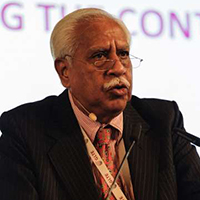
Jayadeva Ranade
The Chinese government is increasingly concerned over the rapid growth of Buddhism in the country according to a recent report by Jayadeva Ranade, president of India’s Centre for China Analysis and Strategy writing for Sunday Guardian Live. The ruling Communist Party fears any organisation large enough to challenge its authority, Ranade suggests, especially one which might hold sympathies for His Holiness the Dalai Lama.
China has seen a sharp increase in Buddhist worship over the past 20 years, says Ranade, with adherents rising from 5% to 18% of the population by 2015. China’s Buddhist community now stands at over 300 million, dwarfing the Communist Party’s 88 million-strong membership.
Growing discomfort with the situation among Chinese officials has led to increased controls over Buddhist teaching and practice, an apparent reversal of policy after their relaxation of religious restrictions in 2007. Ranada cites government activities in Zhejiang province, a popular centre of Buddhist education and training.
“The Buddhist Association of China (BAC) issued a six-point directive in November 2016 calling for the prevention and restriction of the ‘illegal’ propagation of Tibetan Buddhism in China’s Zhejiang province” he wrote. “While not clarifying these ‘illegal’ activities, it prohibits monks practising Tibetan Buddhism from visiting Zhejiang province to give teachings, conduct empowerment rituals, and conduct other ceremonies without government approval. It states that approval is required for teaching of Tibetan Buddhist texts and scriptures or holding other related activities at Buddhist centres…in the province” he continued.
The directive goes on to reiterate an existing ban on religious activity outside approved venues and reminds Chinese Buddhist monks to restrict their practices to those of the official Chinese tradition, he concludes.

Over 200,000 people attending the third day of Kalachakra Empowerment in Bodhgaya, Bihar on January 13,2017
Photo: dalailama.com
His Holiness the Dalai Lama’s 2017 Kalachakra empowerment last month provoked another notable intervention as the government blocked Tibetans from travelling out of China to attend the ceremony, and forced those who had already left the country to return under threat of legal action. Temporary travel restrictions were followed by a blanket ban on the discussion or sharing of material relating to the event on WeChat (a widely used Chinese government sponsored messaging app) and Chinese social media.
Despite Chinese opposition, however, around 2,000 people travelled from Tibet and China to attend the event, just under half of them Han Chinese. A further 140 – 160 ethnic Chinese people visit Dharamshala, the Dalai Lama’s home in exile, each year, many requesting an audience with the displaced spiritual leader.
While the Chinese government offers a limited degree of tolerance to the growth of Buddhism in its heartlands, it is not uncommon for other religious groups to face open hostility. The Falungong faith (A Chinese spiritual practice incorporating elements of meditation, Qigong, Buddhism and moral philosophy) reached 100 million adherents before being all but wiped out by the Chinese administration, while the government continues to undermine the practice of Christianity, Catholicism and Islam through church closures and suppression of worship.




 Print
Print Email
Email